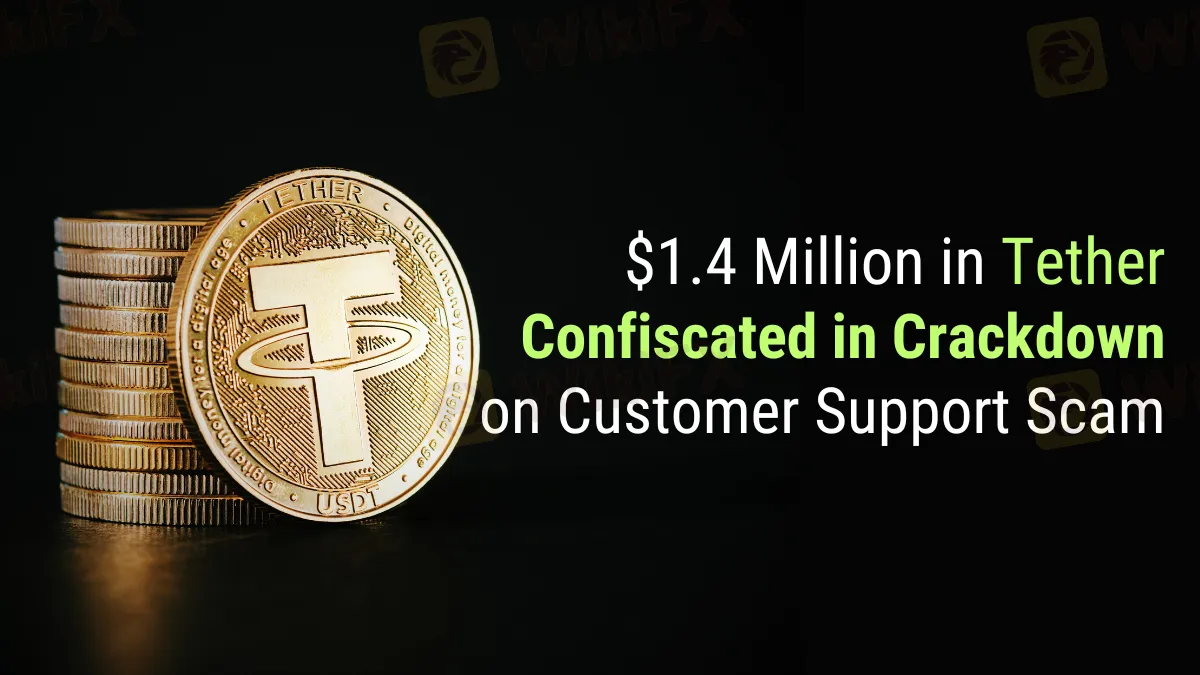简体中文
繁體中文
English
Pусский
日本語
ภาษาไทย
Tiếng Việt
Bahasa Indonesia
Español
हिन्दी
Filippiiniläinen
Français
Deutsch
Português
Türkçe
한국어
العربية
$1.4 Million in Tether Confiscated in Crackdown on Customer Support Scam
Abstract:US Attorney's Office seizes $1.4M in Tether from scam, exposing tactics targeting vulnerable populations. Implications for crypto regulations & DeFi.

In an enormous attempt to stop fraudulent activities, the United States Attorney's Office in Chicago, Illinois, has taken down a customer service scam business and seized about $1.4 million in Tether (USDT). This operation highlights the evolving tactics used by fraudsters in the Internet age, namely targeting the elderly and other vulnerable populations.
Tether, the DOJ, and the FBI were in charge of organizing the theft on March 12. Scam pop-ups said that the victims' computers had taken over as a component of a larger scheme. They informed the victims that their bank accounts were at risk when they called the fictitious customer service number. Following their deception of the victims into thinking USDT would safeguard their property, the scammers asserted their ownership of the tokens.
An uncommon accomplishment in the battle against digital fraud is the successful recovery of USDT from an unhosted digital currency wallet, which sets this instance apart. A January 24 document reveals that the money seized was painstakingly traced to five separate wallets linked to a wire fraud scheme, even if the precise details of the recovery procedure are still unclear. Money laundering may have occurred because intermediate addresses transmitted small amounts of money.
Despite conducting a significant portion of its activities in foreign countries, Tether remains subject to regulatory oversight by the Office of Foreign Assets Control (OFAC) of the United States. The recent sanctioning of Tether's association with Tornado Cash, an Ethereum network coin mixer, by OFAC, underscores the need for international collaboration in the battle against money laundering in the cryptocurrency business.
Future stablecoin rules will provide Tether with significant challenges in the long term. According to recommendations made by organizations like JPMorgan Chase, the government may ultimately favor stablecoins that adhere to AML and Know Your Customer (KYC) regulations. These restrictions are becoming more open. The decentralized finance (DeFi) sector could potentially experience substantial transformations in light of these legal developments, considering the USDT's significance as a collateral and liquidity resource. Ensuring the protection of consumers against fraudulent activities continues to be a principal consideration as the digital banking industry progresses.

Disclaimer:
The views in this article only represent the author's personal views, and do not constitute investment advice on this platform. This platform does not guarantee the accuracy, completeness and timeliness of the information in the article, and will not be liable for any loss caused by the use of or reliance on the information in the article.
Read more

Axi Bids AUD 52M to Acquire Low-Cost Broker SelfWealth, Outbidding Competitor Bell Financial
This acquisition attempt by AxiCorp Financial Services Pty Ltd, Axi’s parent company, values SelfWealth at AUD 0.23 per share and is notably higher than a recent bid made by Bell Financial Group Limited (ASX), which offered AUD 0.22 per share.

Crypto Influencer's Body Found Months After Kidnapping
The body of missing crypto influencer Kevin Mirshahi, abducted in June, was found in Montreal. A woman has been charged in connection with his murder.

Bitfinex Hacker Ilya Lichtenstein Sentenced to 5 Years in Prison
Bitfinex hacker Ilya Lichtenstein was sentenced to 5 years for stealing 120K Bitcoins as the cryptocurrency soars past $93K amid bullish market trends.

Italy’s CONSOB Blocks Seven Unregistered Financial Websites
Italy’s CONSOB ordered seven unauthorized investment websites blocked, urging investors to exercise caution to avoid fraud. Learn more about their latest actions.
WikiFX Broker
Latest News
CySEC Warns Against Unauthorized Investment Firms in Cyprus
Why Even the Highly Educated Fall Victim to Investment Scams?
Warning Against Globalmarketsbull & Cryptclubmarket
Dukascopy Bank Expands Trading Account Base Currencies
UK Sets Stage for Stablecoin Regulation and Staking Exemption
Axi Bids AUD 52M to Acquire Low-Cost Broker SelfWealth, Outbidding Competitor Bell Financial
Crypto Influencer's Body Found Months After Kidnapping
STARTRADER Issues Alerts on Fake Sites and Unauthorized Apps
Italy’s CONSOB Blocks Seven Unregistered Financial Websites
Bitfinex Hacker Ilya Lichtenstein Sentenced to 5 Years in Prison
Currency Calculator


